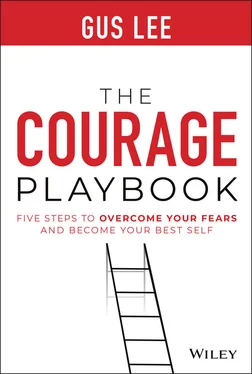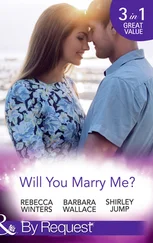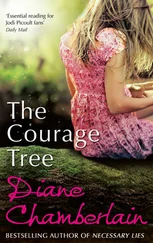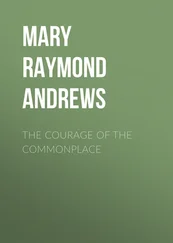Gus Lee - The Courage Playbook
Здесь есть возможность читать онлайн «Gus Lee - The Courage Playbook» — ознакомительный отрывок электронной книги совершенно бесплатно, а после прочтения отрывка купить полную версию. В некоторых случаях можно слушать аудио, скачать через торрент в формате fb2 и присутствует краткое содержание. Жанр: unrecognised, на английском языке. Описание произведения, (предисловие) а так же отзывы посетителей доступны на портале библиотеки ЛибКат.
- Название:The Courage Playbook
- Автор:
- Жанр:
- Год:неизвестен
- ISBN:нет данных
- Рейтинг книги:4 / 5. Голосов: 1
-
Избранное:Добавить в избранное
- Отзывы:
-
Ваша оценка:
- 80
- 1
- 2
- 3
- 4
- 5
The Courage Playbook: краткое содержание, описание и аннотация
Предлагаем к чтению аннотацию, описание, краткое содержание или предисловие (зависит от того, что написал сам автор книги «The Courage Playbook»). Если вы не нашли необходимую информацию о книге — напишите в комментариях, мы постараемся отыскать её.
The Courage Playbook: Five Steps to Overcome Your Fears and Become Your Best Self,
The Playbook
The Courage Playbook
The Courage Playbook
The Courage Playbook — читать онлайн ознакомительный отрывок
Ниже представлен текст книги, разбитый по страницам. Система сохранения места последней прочитанной страницы, позволяет с удобством читать онлайн бесплатно книгу «The Courage Playbook», без необходимости каждый раз заново искать на чём Вы остановились. Поставьте закладку, и сможете в любой момент перейти на страницу, на которой закончили чтение.
Интервал:
Закладка:
The results? Per John Kotter of Harvard, we suffer a 400 percent deficit in leaders at every level. 4 Dr. Paul Brand, an international medical missionary, noted that Americans, who live with greater physical comforts than most in the world, are unequipped to cope with simple discomfort and are especially vulnerable to sharp disappointments. 5
Brimming with good ideas, we have found ourselves back where we began.
We are missing something, and it's big.
What happened? I'll tell you what happened: we lost our courage, and watching endless PowerPoint presentations and taking personality assessments and doing simulations have sadly failed to bring it back. With brains, universities, and a big economy, we sit on the fence of positive action, suffer great falls, and can't put Humpy Dumpty together again.
We've created and then fallen face‐first into a yawning Courage Gap.
But when I was engaged in one‐on‐one executive and private coaching, I did things differently. By guiding clients to courageously stop basic and common negative habits, practice key courageous behaviors, and to be actually accountable, the coaching became personal, relational, and impactful. They became dramatically stronger as listeners, communicators, teambuilders, and effective solvers of tough, recurring problems at work. But beyond that, more importantly, they were able to repeat the same behaviors in their private lives, the place that counts the most. By changing themselves, they inspired change in others. We laughed, not at preplanned jokes to warm up participants, but from experiencing the spontaneous and deeper mirth from the lost art of courageously realizing our foibles. And they then practiced the behaviors of courage, which locked key skills into mind‐muscle‐heart memory, and shared their courage with others. The results were often life‐changing.
I found myself looking more carefully at the goals of leader development and at how to create a training model for real results.
Pitching thought‐based education from a platform or stage, I'd let the university habit of only gathering knowledge to override the practice of courage to equip us to rightly live and lead so we could then actually apply cognitive data.
The first courage book was written for that simpler time and I used boxing examples to illustrate an approach for facing fear. But to train people to actually overcome fear, I had to rely on deeper matters of moral instruction, core identity, family repair, relationship reconciliation, marriage, and parenting.
Half of us are football fans, so half of us aren't, 6 but the sport is instructive regardless of what we like. So I studied the training methods of a once‐obscure college football coach named Bill Walsh. Walsh then took over the worst franchise in sports history—the San Francisco 49ers—and transformed the organization, improved the game, and saw his teams win five Super Bowls. It's helpful to know the answer to: How'd he do it?
First, to form a selfless and unified team structure, he picked morally courageous players instead of egotistical superstars. His prime example was Jack “Hacksaw” Reynolds, a tough, old, slow, over‐the‐hill linebacker. Jack was the “most telling personnel move I ever made,” said Walsh. “He set an example for everybody… that single addition was the key to our success.” 7
Many heard the word—a failing organization was saved by hiring a humble, nondescript, overlooked leader of character—and preferred to focus on the players that Reynolds led to greatness.
Walsh also picked Joe Montana (“too skinny”) and Steve Young (“too reckless”) because he needed smart and studious (vs. big, huge‐armed) quarterbacks who knew his playbook to fluently call, “Green RT Slot Z Opp Fake 98 Toss Z and watch that safety,” 8 and had the mental calmness to make off‐schedule plays. Second, and most importantly, Walsh coached his players to acquire mastery by practice, practice, practice . His coaches identified the skills required for each position. They memorized and practiced hundreds of plays from a huge playbook. Offensive linemen had to personally master 38 specific skills in realistic drills that required more brains than mass. Bobb McKittrick, the bald, well‐read, world‐traveling offensive line coach, turned Walsh's high‐character, undersized, low‐draft picks into 19 Pro Bowl selections. 9
“That's the essence,” said Walsh, “repetition developing skills and then under pressure, being able to perform.” 10
The Playbook does the same, without the bruising or the need for ice baths and physical therapy. And without the weight of Walsh's Oxford English Dictionary– sized game manual.
How many plays do most of us know, and how many of us get coached in courage?
Only a precious few. Thus, The Playbook .
Courage is not a life panacea but it comes awfully close. In the steps of this playbook, you'll see courage acted out by parents and teens, managers, firefighters, nurses, doctors, teachers, C‐levels, and the jobless. People of every background who saw themselves as good but never brave, and then found their courage because they practiced it. They became effective leaders as courage countered individual fears, natural disrespect, bias and discrimination.
Aristotle was the great thinker who invented useful things like empirical research, character training, and the happiness formula. Despite being the scorned alien, he persisted in earnestly training Athenians because they needed his wisdom. He remains fresh for reminding us that courage is the single virtue that helps us navigate hard times of fear and stress in order to achieve our best personhood.
Aristotle also saw that sadness, difficulty, and struggle—the hard signs of our times—can help us break unhealthy habits, inspire us to gain what we're missing and to prep moral meals from disregarded ingredients. Professor Brené Brown found strength in our vulnerabilities. Researcher Dr. Angela Duckworth discovered that low points can lead to high ones.
The data tells us that we can leverage sadness and dismay to defuse old habits of fear, find our forgotten courage, reframe poorly defined mindsets, and even overwrite sad pasts.
Courage, unlike avoidance, is a positive, heroic verb. Unlike utopia, it's not a fictional notion. Like sports, it becomes real with practice. Courage is the unique virtue that gives us deep values like self‐control, integrity, respect, generosity, love, justice, trust, and an authentic caring for others—the sweet higher order goods that represent our deepest, heartfelt desires.
J.M. Barrie, polymath educator and creator of Peter Pan , recognized courage as a life goal. He bluntly warned college graduates: “If courage goes, then all goes.” 11
We no longer speak or act courageously at work, in our families, or in the public square. We privately say totally wrong things to ourselves that deepen our fears and separate us from our courage. We seek comfort by hopefully reciting that we're special while not remembering that courage calls us to see what is unique in others.
Despite a deep inner need, courage has few followers, fewer advocates, and no network. It lacks a central, unified curriculum and has no cultural platform and few champions. It faces powerful and corrupt foes in business, government, and society. Once the path of the good life and the renewable fuel for human thriving, courage is now a boutique answer to an arcane trivia question and a distant theory. It seems to be a pleasant thought without boots on the ground.
We think we're okay without it. We think practicing it is unnecessary.
This is a huge mistake.
It's unwise to unfriend courage, gaslight ourselves with barrages of bad news, and nurture our fears as if they were household pets. It's wrong to ignore the practice of courage to be captives of our anxieties.
Читать дальшеИнтервал:
Закладка:
Похожие книги на «The Courage Playbook»
Представляем Вашему вниманию похожие книги на «The Courage Playbook» списком для выбора. Мы отобрали схожую по названию и смыслу литературу в надежде предоставить читателям больше вариантов отыскать новые, интересные, ещё непрочитанные произведения.
Обсуждение, отзывы о книге «The Courage Playbook» и просто собственные мнения читателей. Оставьте ваши комментарии, напишите, что Вы думаете о произведении, его смысле или главных героях. Укажите что конкретно понравилось, а что нет, и почему Вы так считаете.












